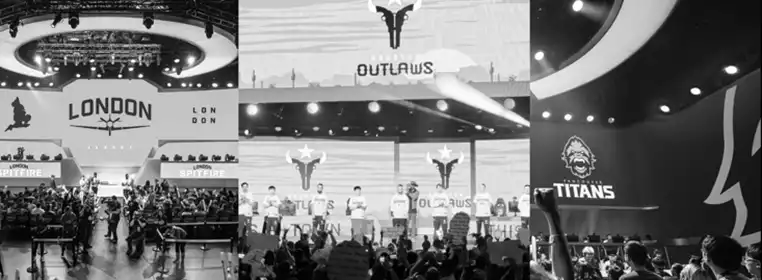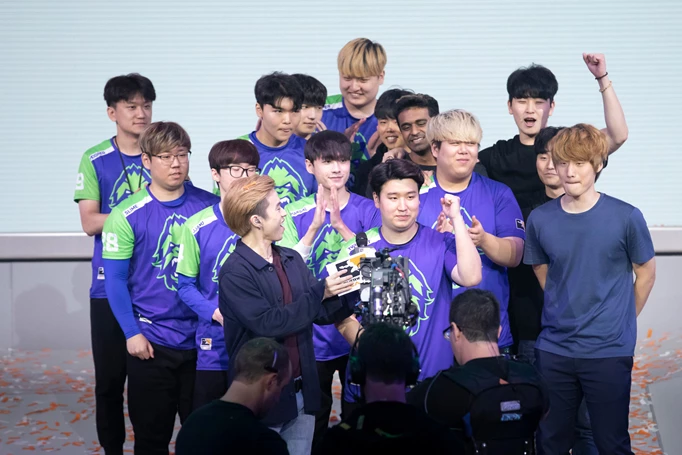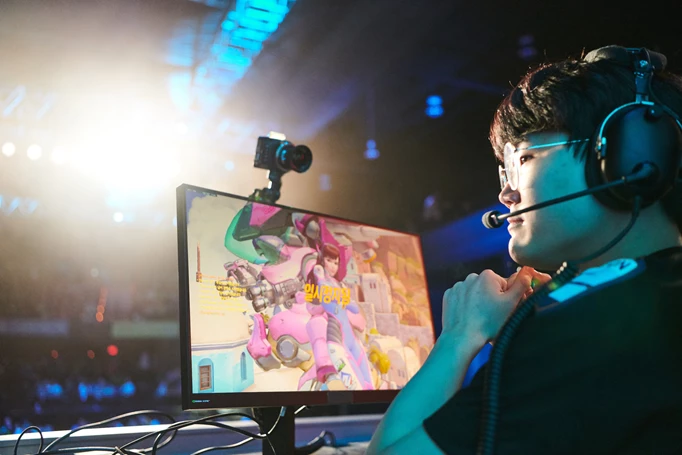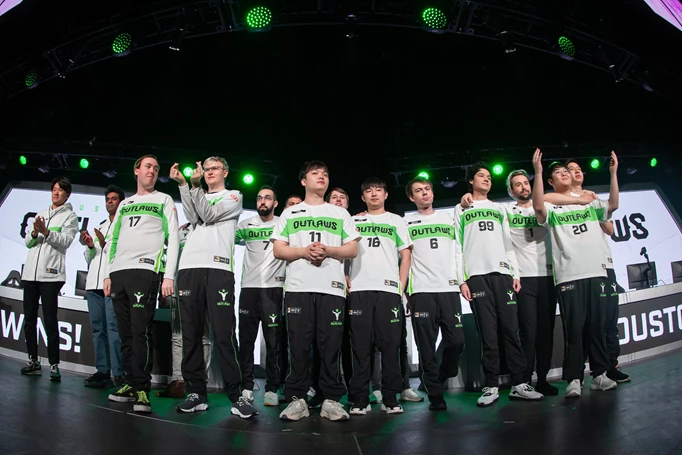What Could The Early Exit From Playoffs Mean For The Spitfire, Titans and Outlaws?

After 24 hours into the start of the Overwatch League playoffs, three team flairs have been faded from the tournament bracket. Through mediocre season performances, these franchises had put themselves into positions in which one underperformance in the playoffs would eliminate them without the possibility to go through the lower bracket. As a result, their off-season started early with plenty of time to reflect and plan for the next season.
However, their seasons weren’t created equal, and all of them faced unique challenges that were thrown in their way, unable to build a foundation of stability. Analysing the base of their seasons, the development throughout, and the likely expectations for 2021, we can wager a guess where their journey might go. What does the early exit mean for the future of the London Spitfire, Vancouver Titans, and Houston Outlaws?
Two teams, one name - Vancouver Titans
For obvious reasons, the Titans’ season requires a clear cut when evaluating the performance of both rosters given the fiasco that happened to this franchise. After having finished first in the regular season and reaching the finals in the playoffs of season 2, the Titans were still in need of some adjustments to their rosters. As the Shock will tell you, even champions have things to improve on and so rightfully the Titans became active on the transfer market. Shedding four players in Jung-keun "Rapel" Kim, Jang-hyeon "TiZi" Hwang, Dong-eun "Hooreg" Lee in the post-season, and previously Sang-beom "Bumper" Park during the active season, the team needed a new main tank and so they brought in Chan-hyung "Fissure" Baek, no doubt a recruitment that was neither cheap nor a safe call. The Titans also shelled out for Jehong "ryujehong" Ryu, a signing that only ever made sense from a marketing perspective, having seen the quality of Jooseok "Twilight" Lee as a top tier flex support player, which he continues to be even now on the San Francisco Shock.
The break in the mid-season in which the team had a dispute with the organisation about the accommodations provided to them both in Canada and in South Korea not only ended one of the most important storylines in Overwatch history, it also put a burn mark on the reputation of the Vancouver Titans as an organisation that will no doubt follow them into this off-season. The Titans had arguably spent their budget in an unwise manner with their recruitments, though COVID-19 likely exacerbated the issues that players felt in the practice environment provided. While planned to be on the road for most of the year, suddenly players felt isolated in the practice facilities provided to them. The team and the organisation fell out and ultimately decided to part ways.

 Click to enlarge
Click to enlargeWhoever you have more at fault here is unlikely to matter during the coming off-season. What really matters it the perception that the organisation communicated to possible talent that is entering the transfer market this season, and how they think about the Vancouver Titans as a host of their talents.
Filling up their team with a selection of North American contenders talent likely at a tight budget, the new roster with as little time as they had, arguably overperformed expectations, managing to upset decent teams on occasion and managing to locate diamonds in the rough in players like Niclas "sHockWave" Jensen.
It is unknown if the low budget approach this season communicated an intent to move forward with a similar strategy in season 4, or whether it was a necessary move given the fallout from the global pandemic that will be reevaluated against the upcoming challenges.
For the Titans, it will be paramount to communicate an image to potential prospects that they’ve grown from the experiences this season. With sHockWave, the team has arguably found a star player to build the team around and the coaching staff around head coach Steven "Flubby" Coronel has a reputation of elevating its parts beyond their perceived value. Given their current foundation, the team could aim for a vision like the one of the Los Angeles Valiant and for that it would be important to secure a base roster early in the off-season to attract additional talent. Unless the Titans invest serious money, they are unlikely to experience a bounce-back the likes the Shanghai Dragons or the Florida Mayhem have had, but could build upon an exciting rookie underdog story that no doubt fans have an appetite for.
The “Invisible” London
Coming off a disappointing second season in which the defending champion of season 1 only barely scraped into playoffs, the Spitfire decided for a close to tabula rasa roster approach, only keeping Young-hoon "Krillin" Jeong around. Securing the former New York Excelsior head coach Hyeon-sang "Pavane" Yu relatively late in the signing window (though now in an assistant coach position) and shortly after bringing in Fusion Uni alumni Se-won "BERNAR" Shin and Tae-hoon "Fuze" Kim, the team started scouting fairly unknown Korean contenders talent, dodging most of the elite talent forges like the Element Mystics likely due to differing buyout dimensions. The only other bombshell signing came with Gil-seong "Glister" Lim, who was projected to be one of the shining rookies of season 3 and held up to that expectation relatively well even on a team that wasn’t winning much. Sung-hyeok "Highly" Lee, who came from the Seoul Dynasty main roster and Glister, who played for their academy team Gen.G, were likely part of a deal for the star-studded duo of Jae-hee "Gesture" Hong and Joon-yeong "Profit" Park.

 Click to enlarge
Click to enlargeWith the league in lockdown and the regions split, London relocated to Asia. The new split saw the Spitfire without much opposition to consistently farm wins off of, and instead confronted them with a selection solid to great teams every weekend. It should not be forgotten that during the pre-COVID stages, the Spitfire took games off of the Justice, the Outlaws and even the Florida Mayhem. While these teams certainly weren’t in their best shape at the time, the same benefit should be given to London as a newly formed roster historically always demanded a similar grace period. It is therefore hard to judge where the team could’ve ended up had the competition stayed open, though a comparison to the Valiant might not appear to be unearned. That said, the Spitfire find themselves out of the playoffs in the first round against an admittedly strong appearing Chengdu Hunters. In terms of marketing themselves to an audience, the perception which is communicated in the community is that they are largely invisible and that fans didn’t see a reason to be excited about the project. This is a stark disconnect from the initial evaluation that many pundits shared, thinking that while the experiment was likely to not strike gold, it was at least an interesting endeavour to undertake. This message didn’t seem to translate to the fanbase at large.
As a projection for the future, it should be noted that the Spitfire have held onto their academy team, the British Hurricane, while other teams have not. While I’m sure it isn’t as apparent on the inside as it feels on the outside, a merging of these two promising developmental programs could lead to surprising results. The Hurricane are simply dominating European Contenders and some of their pieces have definitely communicated OWL-level qualities. Take for instance Hadi Daniel "Hadi" Bleinagel and William "SparkR" Andersson, players with great potential to move forward. Paired with the likes of BERNAR and Glister, the team would suddenly have a solid foundation for a hybrid roster. With a Korean coaching staff already in place and a couple of additions from the academy team’s staff, a marriage of those two teams could lead to fruitful outcomes. Keep in mind that the Spitfire likely are incentivised to appeal to their market and that the British Hurricane have for a long time provided OWL-tier talent like Daniel "FunnyAstro" Hathaway, Seb "numlocked" Barton and Cameron "Fusions" Bosworth to other Overwatch League teams. The lessons from Fusion Uni may show that homegrown talent is a way to derive great value out of an academy team and the quality of their players has been apparent for a long time.
A transitional season that was not meant to be - Houston Outlaws
Finally unshackled from the confines of being overseen by the league itself after the acquisition of Infinite Esports by Immortals Gaming Club (the owners of Los Angeles Valiant), season 3 was supposed to be the moment when the Outlaws could finally course correct. Letting go of coaches Hyun-woo "HyunWoo" Kim and Tae-yeong "TaiRong" Kim, the team added Harsha Bandi, Chris “Dream” Myrick and Dong-eun "Hooreg" Lee to the staff, while transitioning the players Matt “coolmatt” Iorio and initially Matt “Clockwork” Dias to a staff role. Moving further away from their history, Jacob “JAKE” Lyon retired and moved on to become a caster for the Overwatch League while Christopher “Bani“ Benell and Wonhyeop "ArHaN" Jeong moved on to coaching. These moves seemed calculated and understandable, having to let go of their history and profile of their team in order to improve. Jung-keun "Rapel" Kim, Tae-hong "MekO" Kim and Seung-soo "Jecse" Lee were brought in as known quantities. MekO and Jecse had built a reputation for being good and consistent performers throughout their history and with the latter delivering arguably above expectations and becoming a force to be reckoned with on the main support role. Rapel was a player familiar to head coach Harsha due to their shared time on the Vancouver Titans, so this pickup too seemed fine.
More confusing were the re-signing of Daniel “Boink” Pence and the recruitment of both João Pedro "Hydration" Goes Telles and Jeffrey "blasé" Tsang at the same time. The team initially also lacked a backup for Austin “Muma” Wilmot, which was only provided by an unusual role swap of Hydration over to the tank roll.

 Click to enlarge
Click to enlargeThe start to the season became a disappointment. Initially not unexpected for the Outlaws to qualify for the mid-season tournament (that was supposed to be determined of the score from the first nine matches) based on a relatively weak-looking strength of schedule that this match period had in store for them. After nine disappointing games against admittedly stronger than expected opponents like the Florida Mayhem and the Paris Eternal, Outlaws ended the first nine matches at a score of 2-7. Heads rolled and so long-standing Matt "flame" Rodriguez was let go with Adam "MESR" De La Torre departing too.
Picking up their performance and exiting the basement of the North American region, the Outlaws lacked a breakthrough performance which they couldn’t find in the season playoffs either, to add insult to injury losing against the Boston Uprising.
The Outlaws future feels most up in the air. They don’t have assets like an academy team to fall back on and indeed, if we want to discount ArHaN as a “rookie” pickup during season 1, the organisation is the only Overwatch League franchise that has no singed a rookie player. Moreover, the team doesn’t have an academy program to fall back on and is relatively understaffed in comparison to other Overwatch League teams. Worst of all, the team performed well in scrims throughout several metas but could never deliver to the same extent on the server. For those unfamiliar with the patterns of scrimbux, their case is highly unusual and only a few teams have displayed these qualities before.
Finding obvious faults, therefore, proves difficult and range from the makeup of the team lacking a leader through irreconcilable language barriers to the psychological make-up of the team to falter in situations of high pressure. Whether the team needs to clean house, add new leadership in the form of additional coaching staff or key players is hard to foresee. Most of all, Houston Outlaws must not repeat the mistakes of letting unneeded baggage from seasons past linger, which season 3 was meant to fix. Instead, the team let go of its profile as “the American team”, didn’t manage to deliver upon its potential and remained inflexible in the transfer market throughout the season.
All rough failures provide the ground for radical measures when mere augmentation fails. The silver-lining for all three last-place teams is that they’ve been given an opportunity to think wide and act quickly while the post-season has not yet settled in for their competition.
Images via Blizzard Entertainment
